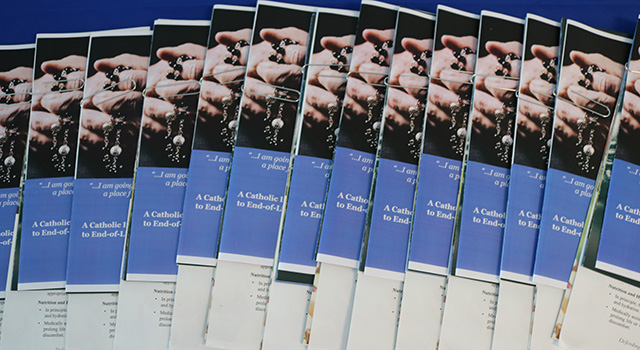By Linda Reeves - The Florida Catholic Palm Beach
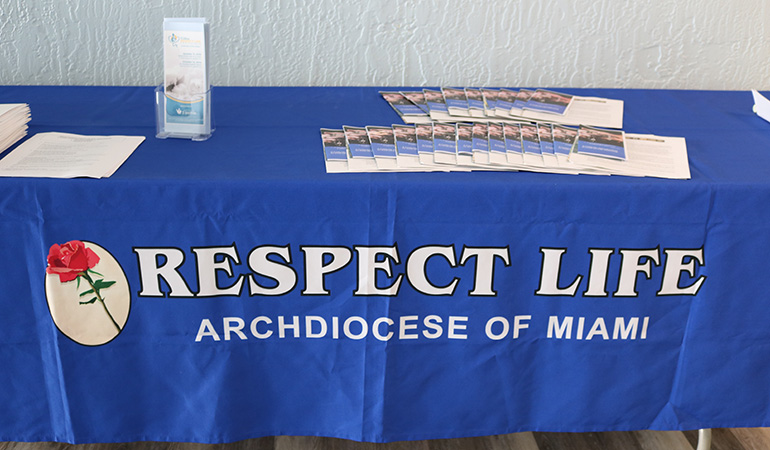
Photographer: LINDA REEVES | FC
A table organized by Respect Life Office of the archdiocese featured an array of educational materials focused on respecting life and end of life issues during A Catholic Conversation about Advance Health Care Planning presentation at St. Coleman Parish in Pompano Beach Sept. 13. Organizers encouraged all to prepare for end-of-life care and to have conversations with loved ones about care wishes.
POMPANO BEACH | As a nurse and hospital bioethics program director, Rose Allen advocates for patient health care and treatment rights and often ministers to families at the bedside of loved ones.
“As you can imagine, in my career I have worked with many families with dying loved ones,” said Allen, a parishioner of Our Lady of Lourdes in Miami for more than 30 years and bioethics program director for Baptist Health South Florida for the past 17.
“In order to properly advocate for the rights of each patient who comes to our hospitals, it is important to know their goals, wishes and preferences for care and treatment. Nevertheless, 50 to 70 percent of patients at end-of-life can’t speak for themselves and only 25 percent have had ‘the conversation’ with family, friends or healthcare professionals. This makes it very difficult to know how to provide care based on the patient’s preferences.”
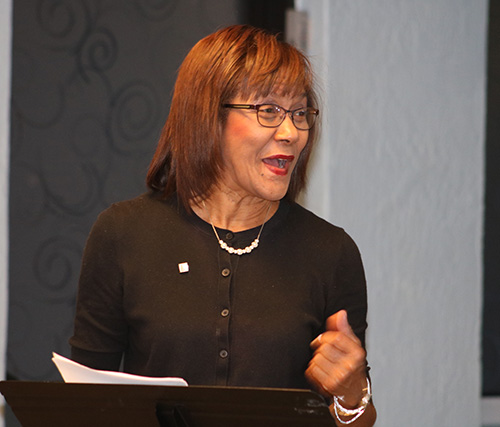
Photographer: LINDA REEVES | FC
Rose Allen, bioethics program director for Baptist Health South Florida in Miami, presents A Catholic Conversation about Advance Health Care Planning to a group of participants gathered at St. Coleman Parish in Pompano Beach Sept. 13.
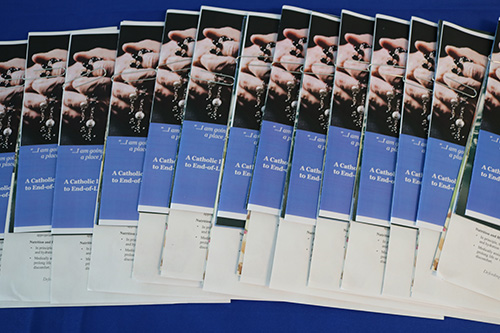
Photographer: LINDA REEVES | FC
A Catholic Introduction to End-of-Life Planning was one of many brochures offered during A Catholic Conversation about Advance Health Care Planning Sept. 13 at host St. Coleman Parish in Pompano Beach. The brochure was distributed by the Archdiocese of Miami Respect Life representatives. The brochure with resources, checklist and prayer is available through the office to help with end-of-life planning encouraged by the Catholic bishops of Florida.
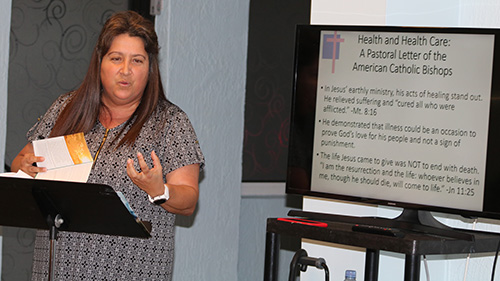
Photographer: LINDA REEVES | FC
Sandi Le Bel, director of education for respect life, welcomes people from around the archdiocese attending A Catholic Conversation about Advance Health Care Planning Sept. 13 at St. Coleman Parish in Pompano Beach.
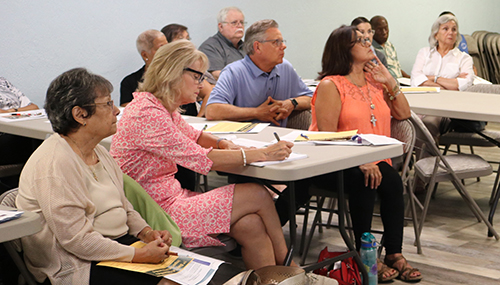
Photographer: LINDA REEVES | FC
Participants listen to Rose Allen, bioethics program director for Baptist Health South Florida in Miami, as she presents A Catholic Conversation about Advance Health Care Planning at St. Coleman Parish in Pompano Beach Sept. 13.
Allen, a critical care nurse for more than 25 years with a doctoral degree in nursing, has written more than half a dozen publications on end-of-life issues. She recently brought her years of experience and knowledge to the Archdiocese of Miami.
In September, Allen presented a program titled “A Catholic Conversation about Advance Healthcare Planning.” The program was offered through the diocesan Respect Life Office and presented at host parishes Our Lady of Lourdes, St. Coleman in Pompano Beach, and Nativity in Hollywood.
A Catholic Conversation about Advance Healthcare Planning was organized by Allen working with Father Alfred Cioffi, associate professor of biology and bioethics at St. Thomas University in Miami Gardens, and Sandi Le Bel, education coordinator for the archdiocesan Respect Life Office. The educational initiative was designed to encourage people to get better informed and prepared to handle end-of-life issues and end-of-life care in keeping with Catholic Church teachings.
“The Catholic bishops of Florida encourage you to prepare,” said Le Bel as she opened the Sept. 13 program at St. Coleman. “If things come up that might be on your heart, bring them to prayer. If you are struggling with an issue, go to your pastor or a priest or deacon.”
During the evening, Allen touched on legal, medical and ethical issues and talked about the paperwork surrounding end-of-life care and directives — paperwork that must be completed for one’s wishes to be clearly stated and carried out.
The Catholic Declaration on Life and Death for Florida Catholics is approved by the bishops of Florida and conforms to both Florida law and the teachings of the Church. Using the form, a person can designate a health care surrogate and create a living will.
Allen said every adult, 18 or older, should designate in writing at least one health care surrogate to assist in reviewing treatment options for an unexpected health crisis.
Her talks also focused on the importance of talking to family members, doctors and health care professionals about end-of-life medical decisions. Allen urged people to nudge their loved ones to talk about their own personal desires so no one will face the burden of making decisions for someone else simply because the dreaded talk about end-of-life never came up or was avoided all together.
An array of documents, brochures and publications were made available to program participants.
Veronica Jarocki, a parishioner at St. Coleman, picked up a packet full of materials to take home with her. “I came to gather information,” she said. “I like the idea that the program is Catholic.”
Allen suggested that discernment is the first step to preparing for end-of-life care and death. She encouraged everyone to personally decide what issues are truly important to them and why. She emphasized repeatedly the importance of speaking to family members and health care professionals about any medical preferences around issues such as pain treatment, feeding tubes and life support, and making sure they are in line with Catholic teachings. Putting one’s financial affairs in order is another thing to consider.
Allen stressed the importance of putting end-of-life care wishes in writing and completing the necessary documents while in good health.
“Let’s do it early while we are in sound mind,” she said. “It is the best gift you can give to a loved one. This allows you to be in control of your health care even when you are unable to speak for yourself. You will remain in control. That is when we should do it.”
She also reminded all that death is part of life.
“The day we are born, we are death eligible,” she said. “Death is a celebration. We have worked hard to be with God. It is a glorious time. It is a transitional time. We shouldn’t be fearful. It is about preparing.”
END-OF-LIFE NUMBERS
- Data from the California Health Care Foundation indicates that only 27% of people have actually talked with their loved ones about end-of-life care.
- Only 7% of people report that they have talked to their doctor about their wishes for medical treatment toward the end of life.
- More than 60% of people say that making sure their family is not burdened by tough decisions is extremely important, but 56% of people have not communicated their end-of-life wishes.
- More than 80% of people say it is important to put their wishes in writing, but only 23% have actually done it.
END-OF-LIFE CHECKLIST
- Become informed.
- Select a health care surrogate.
- Decide what matters to you.
- Share your medical decisions with others.
- Create a plan.
FIND OUT MORE
- For more information about advance health care planning and end of life resources contact the Archdiocese of Miami Respect Life Ministry at 954-981-2922 or 954-981-2901. To download resources, visit www.respectlifemiami.org/end-of-life.
- To learn more about the, the U.S. bishops’ Ethical and Religious Directives for Catholic Health Care Services visit: www.usccb.org/issues-and-action/human-life-and-dignity/health-care/upload/Ethical-Religious-Directives-Catholic-Health-Care-Services-fifth-edition-2009.pdf.
- The Conversation Project, promoted by Baptist Health South Florida, is dedicated to helping people talk about their wishes for end-of-life. The program is an initiative of the Institute for Healthcare Improvement, a not-for-profit organization. Visit: www:theconversationproject.org.
- Baptist Health South Florida Advance Directives Documents are found at www.baptisthealth.net.
